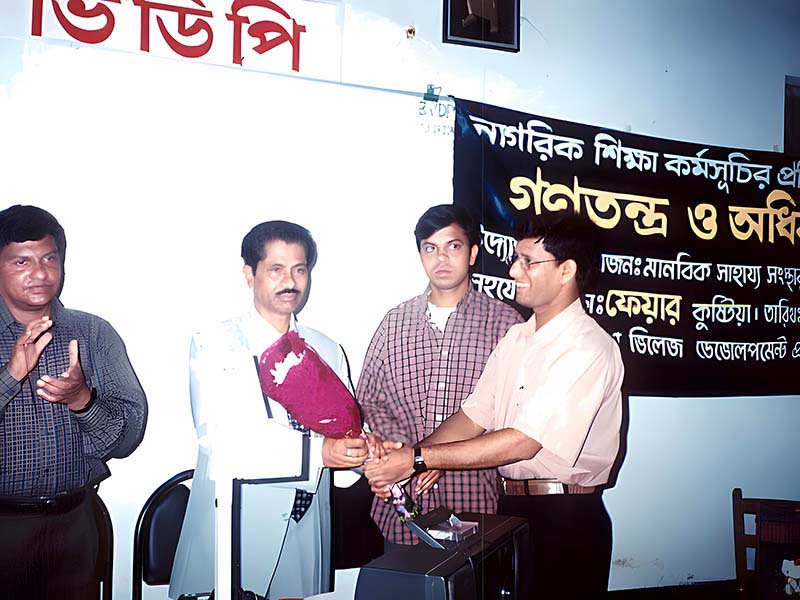
Human Rights Education Project
Project Background and Problem Statement
The foundation of a robust democratic system and a sustainable human rights education culture lies in the creation of a well-educated and conscious civic society. Promoting democracy and civic awareness in Bangladesh is essential to tackling human rights violations, reducing social inequality, and ensuring accountability. Many communities, particularly in rural areas, suffer from limited knowledge of their democratic rights, voter responsibilities, and human rights.
To address these issues, Friends Association for Integrated Revolution (FAIR) initiated the Human Rights Education Project with support from Manabik Shahajya Sangstha (MSS) and funding from the Academy for Education Development (AED). Implemented across ten unions of Kushtia Sadar Upazila from 2003 to 2006, the project aimed to educate community members about democracy, voter rights, and human rights, while empowering them to take an active role in fostering a rights-based society.
Objectives of the Project
Primary Objective: To enhance democratic practices and improve the human rights situation through community education and mobilization.
Specific Objectives:
- Educate community members on democracy, civic rights, and voter responsibilities.
- Strengthen local capacity by establishing Human Rights Watch Groups made up of professionals and activists.
- Promote active community participation in protecting human rights and fostering democracy.
Working Area
The project was implemented in 10 unions of Kushtia Sadar Upazila, targeting rural communities with limited access to information about their rights and responsibilities.
Project Duration
November 2003 – December 2006
Donor
The project was funded by the Academy for Education Development (AED) through Manabik Shahajya Sangstha (MSS).
Key Activities
- Community Group Formation:
- Organized groups within communities to serve as platforms for discussing human rights and democracy.
- Enabled community members to share experiences and challenges related to human rights violations.
- Formation of Human Rights Watch Group:
- Established a Human Rights Watch Group consisting of professionals, activists, and local leaders.
- Monitored and advocated for human rights protection in the target areas.
- Training of Trainers (TOT):
- Conducted TOT sessions to equip trainers with the knowledge and skills needed to deliver education on human rights and voter responsibilities effectively.
- Created a pool of trained trainers to sustain education initiatives beyond the project period.
- Education Sessions:
- Delivered education sessions on human rights, voter rights, and democracy to community groups.
- Focused on practical applications of human rights principles and the importance of active civic participation.
- Community Mobilization:
- Engaged communities through awareness campaigns, workshops, and participatory discussions.
- Promoted the importance of collective action in upholding democratic values and protecting human rights.
Achievements and Impact
- Community Awareness: Educated over 2,625 community members on democracy, civic rights, and voter responsibilities, empowering them to participate actively in democratic processes.
- Formation of a Human Rights Watch Group: Established a functional group in Kushtia Sadar Upazila, comprising professionals and activists dedicated to monitoring and advocating for human rights.
- Sustainable Capacity Building: Created a network of trained trainers and community groups, ensuring the continued promotion of human rights education in the region.
- Improved Civic Engagement: Strengthened community involvement in protecting democratic practices and fostering a culture of accountability.
Challenges Faced
- Cultural Resistance: Many community members initially resisted engaging in discussions about human rights due to deep-rooted societal norms.
- Limited Resources: Financial and logistical constraints limited the scope of outreach activities.
- Skepticism About Change: Some community members doubted the impact of human rights education, requiring additional efforts to build trust.
Lessons Learned
- Community Ownership is Vital: Actively involving community members in project planning and implementation enhances the sustainability of outcomes.
- Education Drives Change: Continuous education on human rights and democratic values is essential for shifting societal norms.
- Collaboration Strengthens Impact: Partnering with professionals and local leaders amplifies the effectiveness of advocacy and education efforts.
Conclusion and Future Directions
The Human Rights Education Project has made significant strides in fostering awareness about democracy and human rights in Kushtia. By educating community members, forming dedicated groups, and promoting civic engagement, the project has contributed to building a more informed and rights-conscious society.
Future Directions:
- Expand the project to additional unions and upazilas.
- Strengthen the Human Rights Watch Group’s advocacy efforts.
- Develop advanced training programs to address emerging human rights challenges.
- Enhance collaboration with local and national stakeholders to sustain the project’s impact.
Call to Action
Join us in our mission to build a democratic and rights-conscious society. Contact FAIR today to learn how you can support our human rights education initiatives and help empower communities to uphold democratic values and human rights.
